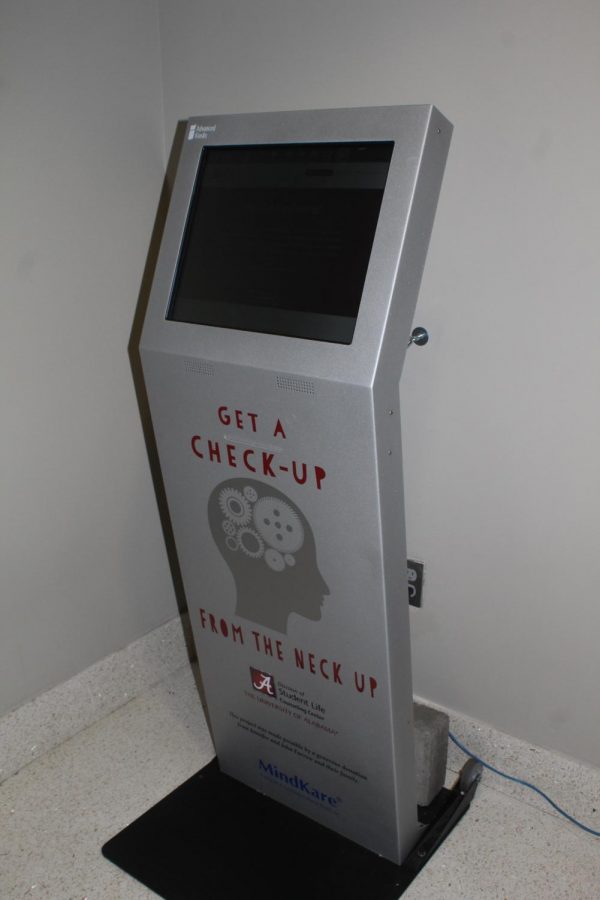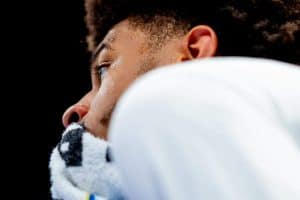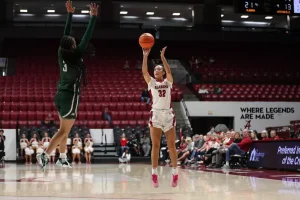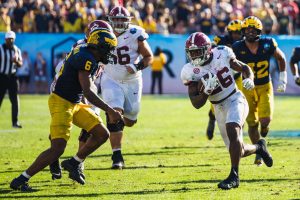MindKare kiosk offers support for students
August 30, 2018
UA introduces new mental health kiosk
Because of the resources the University of Alabama Counseling Center offers, students like Bryan Covington, a junior majoring in marketing and president of Active Minds at Bama, have had help gauging stress or anxiety levels and have learned how to better cope with it.
To continue its support for students with mental health conditions, a new nonprofit resource aiming to meet the needs of students seeking mental health support services on campus, the MindKare Mental Health Kiosk, implemented by the UA Counseling Center, is now available at The University.
The MindKare Mental Health Kiosk is an automated machine questionnaire that students can use in public and remain anonymous. The machine is programmed to calculate the person’s response and then suggest services for users to reach out to. The kiosk is located on the second floor of the Ferguson Center.
“The kiosk includes a touch screen display to provide users with a seamless experience as they navigate through educational information about mental health conditions, a screening assessment and local treatment resources,” according to a UA press release.
Greg Vander Wal, assistant director of the Counseling Center, said he is excited to see students encouraged to seek help.
“It’s a program that really can inform and empower students to kind of take an active role in their well-being,” he said. “It kind of supports this idea that they can reach out, that they have some control they can gather resources for themselves and reach out for help if it’s needed.”
Vander Wal said he believes the priority of this program is to make sure students are aware of the support resources and services available to them on campus.
“Our biggest concern on campus is finding ways to reach students and to reach them not just once but throughout their time here at the University,” Vander Wal said. “It is so easy to kind of dismiss, like when you hear about a counseling center at a time period when you’re doing good and you don’t really have a need for that. Making our services visible to people on a consistent basis, so that when, if they ever do get to that point where they need help, it’s right there in front of them.”
Vander Wal said students remain anonymous throughout the assessment, and screenings are intended to be confidential so no data is gathered on the student.
“We think that’s important because I think that does help bring down any potential barriers that a student might have toward asking these questions of themselves,” he said.
Within the kiosk questionnaire, Vander Wal said there are questions related to thoughts of suicide and abuse. To ensure the safety of the user, the individual is given specific information to seek help.
Vander Wal said he hopes the program will bridge the gap between students feeling they might have a concern and taking the steps toward getting the care and help they may need.
“Our university here is committed to the health and well-being of its students,” Vander Wal said.
Since MindKare Mental Health Kiosks are created to be available in public, Covington said the goals and future of the program are to combat stigma.
“Our goal is to normalize mental illness as it aims to reduce stigma that we have on college campuses,” she said. “I think that by putting it out in the open is obviously, like, something that is going to show that yes, this exists on college campuses and yes, like, we need to deal with this head on because, obviously, there is such an issue with college students who deal with anxiety and with depression and various other mental illnesses.”
Covington said she has concerns users will feel like the program is diagnosing them, even though it is not a licensed doctor.
“We don’t want anybody to be under the impression that they maybe don’t have what they thought they had, and they need to seek help from someone else, that’s not the perfect match for them, and that sort of thing,” she said.
Though she said there is good and bad with the kiosk program, Covington is excited to see a boost in self-esteem as mental illness becomes something that is OK to have and deal with.
“I think that having it on college campuses can help us a lot with ending or decreasing the negative stigma that’s here at UA’s campus,” she said.
The kiosk program began on Wednesday, Aug. 22 and will be available for the remainder of the academic year.
To try out the MindKare Kiosk self-evaluation, visit the UA Counseling Center website and click “Free online mental health screenings” under the “Programs” tab. For questions or concerns, call the Counseling Center at 205-348-3863, or reach out to the University crisis text line by texting BAMA to 741-741.










